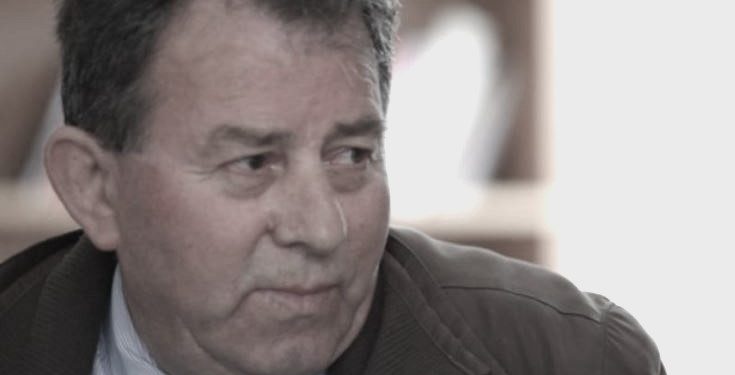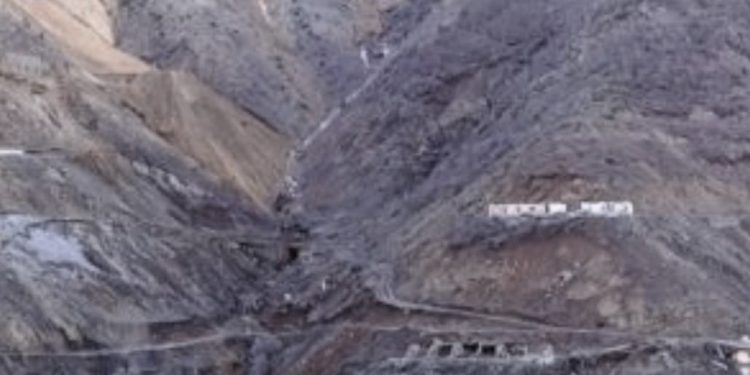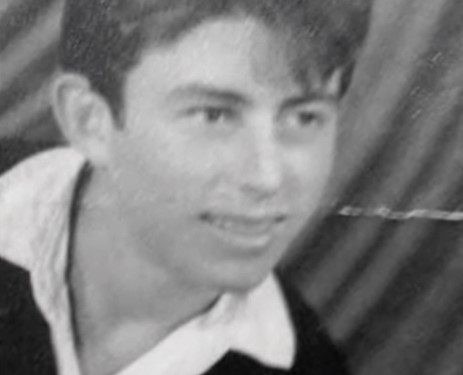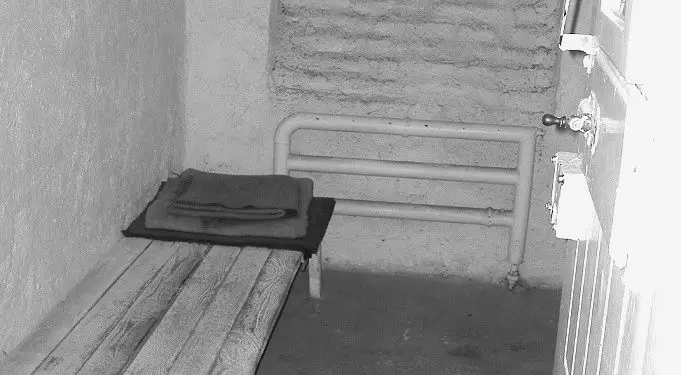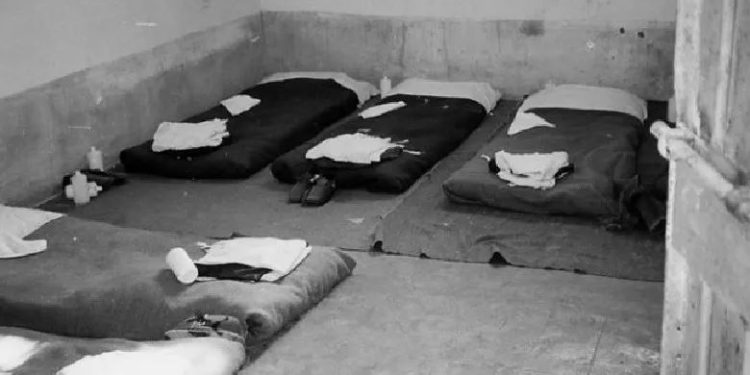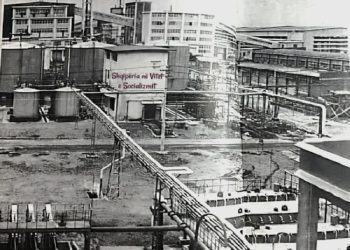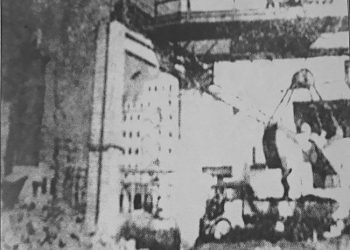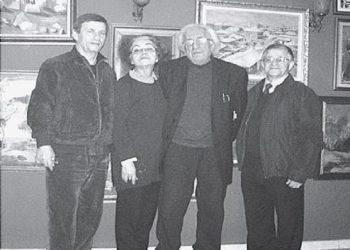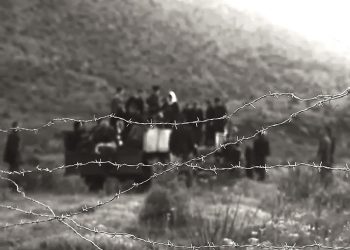By Shkëlqim Abazi
Part Twenty-seven
Memorie.al / I were born on 23. 12. 1951, in the black month, of the time of mourning, under the blackest communist regime. On September 23, 1968, the sadistic chief investigator, Llambi Gegeni, the vile investigator Shyqyri Çoku, and the cruel prosecutor, Thoma Tutulani, mutilated me at the Branch of Internal Affairs in Shkodra. They split my head, blinded one of my eyes, deafened one of my ears, after breaking several of my ribs, half of my molars, and the big toe of my left foot. On October 23, 1968, they took me to court, where the pitiful Faik Minarolli gave me a ten-year political prison sentence. After they cut my sentence in half because I was still a minor, sixteen years old, on November 23, 1968, they took me to the political camp of Reps and from there, on September 23, 1970, to the Spaç camp, where on May 23, 1973, in the revolt of the political prisoners, four martyrs were sentenced to death and executed by firing squad: Pal Zefi, Skënder Daja, Hajri Pashaj, and Dervish Bejko.
On June 23, 2013, the Democratic Party lost the elections, a more than normal process in the democracy we pretend to have. But on October 23, 2013, the General Director of the “Renaissance” government sent order No. 2203, dated 23.10.2013, for; The dismissal of a police officer. So Divine Providence intertwined with the neocommunist “Renaissance” Providence, and precisely on the 23rd, they replaced me with nothing more or less than the former operative of the Burrel Prison Security. Could anything be more significant than that?! The former political prisoner is replaced by the former persecutor!
The Author,
SHKËLQIM ABAZI
Continues from the previous issue
REPS
(The forced labor camp)
Memoirs
Before I turned seventeen, they threw me in prison on the absurd charge of “politics.” What did I know about politics?! Nothing or almost nothing! Except for one thing that everyone, without exception, was clear about: “Woe to whoever gossiped about the figure of the ‘One,’ woe to whoever doubted the veracity of the Party’s Marxist-Leninist line, woe to whoever joked about the joke of the Great One, even if positively. Woe to the wretched who fell into the clutches of the State Security, for their mother’s milk would come out of their nose!” I thought of my peers who were still playing soccer and games in the cobblestone streets, while I, with a shaven head, lay in the dark cells of the Internal Branches and then had to push through days, nights, months, and years in the pupulit barracks, amidst filth and parasites, with bedbugs, fleas, lice, and mice; under the contemptuous outbursts of ignorant policemen, with a number on my back. An anxiety weakened my heart.
I looked around and saw many old men who, by age, could have been my fathers, but also my grandfather’s peers, and very, very few young people my age, but they too were gray before their time. At that moment, my anxiety turned into an unbearable and murderous nightmare. But those kind-hearted and wise men tried to soften the negative effects of the age difference through the humane treatment they gave me, as if I were their equal. This stimulated the idea in me that I was even older than I actually was.
I practically galloped through the stages; I was no longer seventeen, but one hundred and seventy years old! The above event reinforced my belief that these dear people deserved limitless respect. In conditions of deprivation of everything material, they did what would not be erased from my memory as long as I lived. Although I was lucky enough to survive the prisons and then celebrate and commemorate many special dates and events in life, such as birthdays, engagements, marriages, births of children, grandchildren, and various joys in the family and relatives, none of them emotionally approach, in terms of grandeur, simplicity, good will, and unconditional kindness, the place where it happened; this event without luxury, amidst total misery and an unusual state.
I happened to celebrate my fortieth birthday when hope was being reborn, at the culminating moments of the struggle for the change of political systems; my fiftieth birthday, at the turn of the centuries, in political freedom but with economic hardship, among my closest and dearest people. Maybe my family members exaggerated a little with the celebrations to create a romantic atmosphere, they put a cake with candles in front of me! But anyway, that birthday in prison remains the most original in terms of spontaneity, how it was conceived and how it was “sponsored” by those who had nothing else to give me but their heart and fatherly love. And they bestowed them upon me, unconditionally! Thank you, for life, noble men!
The trial by fire or the testing ground…!
Isolated in the camp cells, I was nearing two months. With a chisel and hammer, I was breaking the concrete and plaster of the laboratory walls. During this period, many concepts about the order and rules of life changed. The mentality also changed, new ideas were born and developed. In the conditions of the new environment, another emotional state was crystallizing, which was forging a new character with more manly features. I had already overcome the insecurity of the first days.
Day by day, the number of acquaintances who kindly accepted me into their circle increased. With the support of my friends and the inexhaustible advice of my family’s acquaintances, my faith, which had been shaken too much in the first moments, returned. I also felt better physically, my muscles strengthened, my hands no longer hurt as they did when I wrapped them in rags; the daily work with a chisel and hammer layered a thick calloused skin on them. My health improved, the whitish paleness of the months of isolation, as well as the clumsy weakness of the first days, were overcome once and for all. Maybe the careful treatment of Doctor Çitozi and the medicines of the omnipresent Dilo had an effect.
Thanks to the constant attention of the old men, I would always have a little more food than the others. So, I broke the hunger a bit, even though the hollow in my stomach was not filling up. Slowly, I was getting used to the rules of life in the camp, and to some extent, I adapted to the schedule of activities. Of course, this was not achieved all at once, but day by day, week by week. I overcame the monotony that grated on my soul in conversations with new acquaintances, from whom I heard quite interesting news. Oh, what stories you would hear there! From the most common to the most fantastic, if you dared to take them for granted, you had to get under the skin of the protagonists, because they often resembled the unrestrained fantasies of “A Thousand and One Nights.” First, what I heard surprised me, but I was more amazed by the protagonists themselves. Many of the narratives seemed incredible to me, even fairy tales that would be a genuine miracle if they happened in crucial life. Anyway, I listened carefully to the storyteller.
Did he tell the truth? Did he tell fabrications? God knew! Did I believe him or not? I don’t know what to say! In that kind of distorted environment, as the communist prisons were, only controversial thoughts could be born, which as a result produced contradictory effects. Maybe these types were experiencing these consequences. Maybe I would also end up in that state?! “Oh God, save my mind!” I prayed with all my heart. But thank God, I would get used to it; the place itself would teach me to distinguish the truth from the fabrications. I began to study the characters. Then, in the course of time, I would also be able to analyze the change that was happening in the subconscious of the individual in conditions of forced isolation. In my childish logic, a series of questions arose: “How did the de-natural psychological processes arise and unfold within the human laboratory? How did the perception of events vary, where truth was intertwined with lies? How were the facts refracted in the sinusoidal mirror of the imagination, often taking on paranoid dimensions that could not even be thought of in normal conditions?
How did the feeling of existentialism and the doubling of personality grow in the one locked in a cage? Why did freedom turn into an obsession, and the slave desire it to the point of madness?” So, there were a series of questions that demanded answers. Of course, I possessed neither the ability nor the intellect to give each one a corresponding explanation, but by taking advantage of the unsparing help of my friends, little by little, I was succeeding. I was becoming a little bit of a sociologist, a little bit of a psychologist, a little bit of a philosopher.
In contact with these individuals, listening to their personal stories, I was able to determine to some extent the personality of the interlocutor, to understand the mentality, to analyze as best I could, the deformation of characters. I was able to perceive how qualities or vices could suddenly arise, how mythomania, telepathy, and narcissism develop in a malignant mind. So, I came to the deduction that it was enough for someone to ride on the wings of unrestrained fantasy and put themselves at the epicenter of the universe; for another to claim that they were continuing the thread of life in the past, where it had once been broken, and for another still, to fantasize about illusive beauty and attribute this to themselves; ultimately, the individual with a sound mind underwent fundamental transformations.
But the more I was able to probe inside the psychological labyrinth of the human laboratory, the more I was surprised by the fact that many of these dreamy types genuinely believed that they lived in that illusive reality they talked about. The more unattainable the possible, the deeper the impassable gap that separated us from the real, the more the confused person sank into unreality. In this tumultuous chaos, only realists could think clearly. Therefore, it was precisely they who became the helmsmen of orientation. Thank God, it so happened that my elderly friends were among the most realistic in those conditions. With long experience, they had the ability to separate doubt from uncertainty, to judge the events and facts of daily life, without passions and with amazing coolness. They tried to inject these qualities into me, even though it was not very easy for them. This is how I explain my orientation, without dilemmas. I never flew into phantasmagorical labyrinths, when many young people my age wandered without a purpose and then were badly disappointed by the harsh reality we clashed with every day.
Whoever failed to properly organize the confrontation with difficulties often ended up either on the barbed wire, torn apart by the soldiers’ automatic rifles, or in pavilion seventeen, without hope of recovery? Father Vaska spoke clearly to me when he explained the philosophy of survival: “Here, my son, in this poisonous reality, the wise man must orient himself and look the truth in the eye, no matter how wild it may be; to reason coolly about the frightening reality and, in the end, to draw the necessary conclusion. But can you close your eyes and give free rein to your imagination? Of course you can! After all, no one prevents you from wandering with your imagination on the wings of freedom! But, eventually, you will return here, inside this barbed wire, where they have forcibly locked us!
Fantasy is hope for humanity! But its realization, in the conditions we are in, remains a perspective objective! Oh, who doesn’t love freedom?! Everyone, without exception! Even I, an old man, sometimes wish to ride Pegasus! But no, my son, everything has been conditioned for us inside this circle. Whether we want to or not, we were caught here, and we will face our fate here! When you forget where you are and who you are dealing with, you can sway for a while in the illusory haze of the unreal world, but this lasts very little, and when Pegasus leaves you, you will bleed heavily! Yes, you will be wounded in the soul, and the bitterest wound is the invisible one. Woe to the one whose dreams are killed, he is the loss of the lost! The upper wounds leave scars on the heart that will not be erased for life!” He paused for a moment, blinked his eyes, and then continued: “Do you know who feels the pain most deeply?! Those who have lost hope and the motivation for life, those who fly with leaks in their phantasmagorical dreams and, badly crushed, wake up on the ground.
And so, whoever cannot find the strength to survive the prison is killed. Yes, yes, killed! Maybe not physically, but mentally or morally. After all, it is the same thing! Then, he seeks to escape the troubles of this world forever, someone throws themselves on the wires, another loses their logic and remains a mindless mummy above ground, and still others lose their dignity and end up either as spies or as immoral people! But a man tries to get up, even if he falls! The fallen one fights to improve, in every way. The one who lacks the courage and initiative and cannot achieve this suffers the pain more deeply. He seeks to compensate for moral weakness by injecting it into others, so as not to feel abandoned and inferior. They feel they are different from the many, so they seek comrades. The lepers of the early middle Ages, locked in quarantines, felt this pleasure, as if they were relieved by the idea that they saw others infected like themselves.
Communism is a kind of epidemic, a leprosy that has seized half the world, which through its ideological doctrine, seeks to induce subvensionist thoughts and deform characters. Therefore, it is everyone’s duty to fight against this evil, to protect their neighbor, but when they cannot, at least to protect themselves. I advise you, son, to put your feet on the ground, because that is the only way you can face this desolate life!” – “Oh Vaska, why are you beating around the bush, my friend! Tell the kid straight, no spy, no immoral, period! – interrupted Uncle Esheref, who was carving a piece of boxwood, the priest’s long lecture. Then, without gloves, he added: “Hey boy, all kinds of people have gathered here, most of them are men of the time, but there are also husks for the wise. So, from these husks, stay far away! Listen to your uncle, if they get in your way, break their noses! Do you understand?! This is the philosophy of today! For the future, Allah will take care of it!”
Meanwhile, I had become closer to my compatriots, the Dyli brothers. They were as similar as they were different from each other. Rizai, the eldest, was tall, calm, and composed; he reasoned every action and weighed every word well before expressing it. Everyone respected him for his extraordinary wisdom, especially for his sound and rational logic in judging various phenomena and events. Muharrem was the opposite; a little shorter in stature, but more filled out, a dark-faced, squat fellow with prominent jaws and a snub nose, like boxers. Stubborn, a choleric type, he would ignite like embers and then calm down like a sheep. Woe to whoever fell into his hands in a fit of anger! He was brave and fearless, but he often lost his logic and, like any crazy hero, did not calculate the consequences.
It happened more than once that I saw him like a raging, crazy beast, with bloodshot eyes. But when he calmed down, you could play with him like an innocent child. He was loyal and resourceful, sacrificing for the weakest and for those he considered a friend or a friend of a friend. He hated spies and immoral people, and often his hatred consumed his reason so much that in each of them, he saw the crooked stick that spoiled the bundle and, without distinction, called them: “the main culprits for all the evils in prisons.” If Rizai had the brain, Muharrem had the stick. One would give the signal; the other would cause the disaster! As patriots from the same city, but more as friends of my father, they became my moral and physical support. I felt among them like a kidney in fat; one supplied my brain with knowledge, the other my heart with courage. When the spy provoked me, these two brothers, in cooperation with the elders, planned my defense without implicating me. With this action, they showed others that I was under their care, so that no one else would dare to try to provoke me.
Rizai encouraged me towards books, giving me lessons in morality and justice; Muharrem did the opposite: “We’re in a jungle here, my boy, the lion makes the law! The deer are destined as food for the wolves! Do you understand or not?!” he insisted. “That’s enough, Muharrem!” his older brother scolded him. “You’ll get the boy in trouble; you’ll send him to the dungeon!” “Stay, you, stay! We’ve all been in dungeons! Oh, what has happened to us! Here we are!” Muharrem returned with a rush. “After all, this is what he needs at the beginning, because later, no one will dare to face him. Listen, my brother, and no one will do you wrong!” and he shook his clenched fists, as if threatening an invisible shadow. If anyone provokes you, don’t wait; kill him first, because if it happens otherwise, it will be over! They will have you under their thumb, then come and get yourself back! But yes, you have us as a support; we won’t leave you alone, my man! Leave Rizai alone, he’s a sheik for a tekke! We are in prison, my dear, if you don’t take care of yourself, they will drag you away! Listen, my brother!” and he crossed his forearms, as if to say that this conversation was closed.
He used the expressions “listen, my brother” and “my boy,” as well as the gesture of crossing his arms, for no reason at all. Under this security, and also seasoned with heroic urges, I took courage, while my age itself made my actions easier. I did not even care about the consequences. In any case, the event that would follow would prove Rrem’s point, in a way; it proved that the lessons a la Muharrem were not in vain. One day, I was left alone inside an annex in the laboratory, in the pit they had marked for me to dig. From the morning, we started working with Maqo, one with a pickaxe, the other with a shovel, but after an hour or so, my colleague was called by foreman Gaqka for some other, more professional work. I was left alone.
I was digging with the pickaxe, and when there was a lot of material, I would clean it with a shovel. The pit had to be about two meters deep, because as the foreman told me, they would bury two bronze rods there for the grounding of the laboratory equipment. The bottom was compact, the layers of calcified slag were like concrete, and the shovel could not handle them, so I was forced to dig once with a bangle, and then clear it with a shovel. “Hopefully, we’ll get some soft soil!” Maqua prayed when we started work in the morning. “Because if the slag continues to the end, we’ll be in trouble, our butts will come out a foot!”
“Don’t worry about it; after all, it’s not the end of the world. If we don’t finish it today, we’ll finish it tomorrow! It’s not like they’re going to let us out of prison if we finish it faster!” I replied with a laugh. “Hey, even if you see your ear without a mirror, they won’t let you out of prison, I know that well! But, the foreman told me that it has to be finished today, because they have set off from Tirana!” With the pickaxe and shovel, I had advanced over a meter and a half deep and continued to dig. On the side of the pit, a pile of earth was rising so high that I could barely see beyond it. I was immersed in it; I wanted to finish it, even alone. I remembered the winter days inside the building, when my comrades froze in the bitter cold of Reps. Then I also wanted to justify the foreman, who in a way had shown himself to be a good person to me; he did not get me into trouble, even when I did not do the work he assigned me. In fact, he even justified me in front of the policemen, taking the responsibility himself.
“When the police come, you don’t say anything!” he would instruct me. “I’ll answer for your work!” “But me…?!” I would interrupt with a joke. “Hey, am I or am I not the foreman, hey?!” “Yes, you are!” I would affirm with a laugh. “Okay, do you understand? They will provoke you, but you don’t know what to tell them! But I know the secrets of the trade and I’ll give them the answer myself, I will!” he would end his advice. Buried in the pit up to my throat, I heard a voice from behind me: “Hey, hey, what a piece! You’re like a doll!” I dropped the shovel and turned my head to see. “Who could have entered without making a sound?!” “It’s a shame, my dear, that they put you there.”
Someone was addressing someone in the feminine gender, which made me turn my head around. I thought that those who had set off from Tirana had arrived and might have a woman with them. Normally this was unbelievable, because women were not allowed to enter prison environments. “But you never know, what doesn’t happen? She might be an engineer, a laboratory assistant, or who knows what!” The pile of earth next to the pit prevented me from seeing clearly. Anyway, my eye caught a prisoner with a white hat and pointed, Raj Kapoor-style mustache. Since I saw no one else, I picked up the shovel again and continued to throw the earth on the pile. In the depths, the layer seemed to become a little softer, and I felt a little relieved.
I took advantage of the opportunity, so I threw the earth far away. “You handsome guy, are you killing us or are you hurt?!” I did not reply, but continued to stick the shovel in. “Speak up, or are you mute?” the Raj Kapoor-style mustached man came closer to where I was buried. “Are you talking to me?!” I asked, not without surprise. “Why, do you see anyone else here, you?!” “No, I can’t see, because I’m in here!” “Well, why are you staying there, you devil! Come on, get out, I’ll lift you up!” and he raised his hand towards me, but instead of the hand I extended, he grabbed my cheek, as if to caress me like a child or a woman is caressed. From the dialect, he must have been from Labëria, but his face did not fall into my memory as someone I had ever seen before.
“He-ey, he-ey, you’re a total star, you!” and he passed his hand to his own face. “Get lost, you trouble, leave me alone in the mess I’m in, here in this cursed pit!” I said to him as if joking. I thought I was dealing with someone mentally unbalanced. Of these types, who under the effect of depression did not know what they were doing, there were many in prisons. “Poor guy, he must be mentally ill!” I thought and immediately lifted the shovel. “Leave the shovel, you! Come on, get over here! Or should I go in there, because I’m dying!” and he rubbed his genitals. From the depth I was in, I measured him with my eyes. “Oh hell, what a disaster has caught me!” His face was purple, like a hot pepper, either embarrassed or sweating. At that time, I did not know how to classify this individual; he was completely unknown to me. “Get out of my face, trouble!” I returned again gently, because I still believed I was dealing with a madman.
“Hey, you’re not getting the hint, you devil! You’re going to be my whore, you!” he began to pant. “As long as I’m around, no one else can touch you! And with me, you’ll escape prison, don’t they call me Sali Nela! I’ve had it with everyone, you bitch-y!” he added quickly in one breath, without giving me time to interrupt him. “What did you say, what did you say? Sali Nela!” Oh God, what a chilling name?! This name sent chills down my entire body. My backbone shivered and my hair bristled like thorns, almost piercing the cloth of my hat. The most hated man in the history of Albanian prisons was standing over me. Every political prisoner had heard the filthy stories of this immoral man from Vlora, so the name alone was enough to scare you. Of course, I had heard about his deeds, but I had not had the chance to meet him personally. Memorie.al




